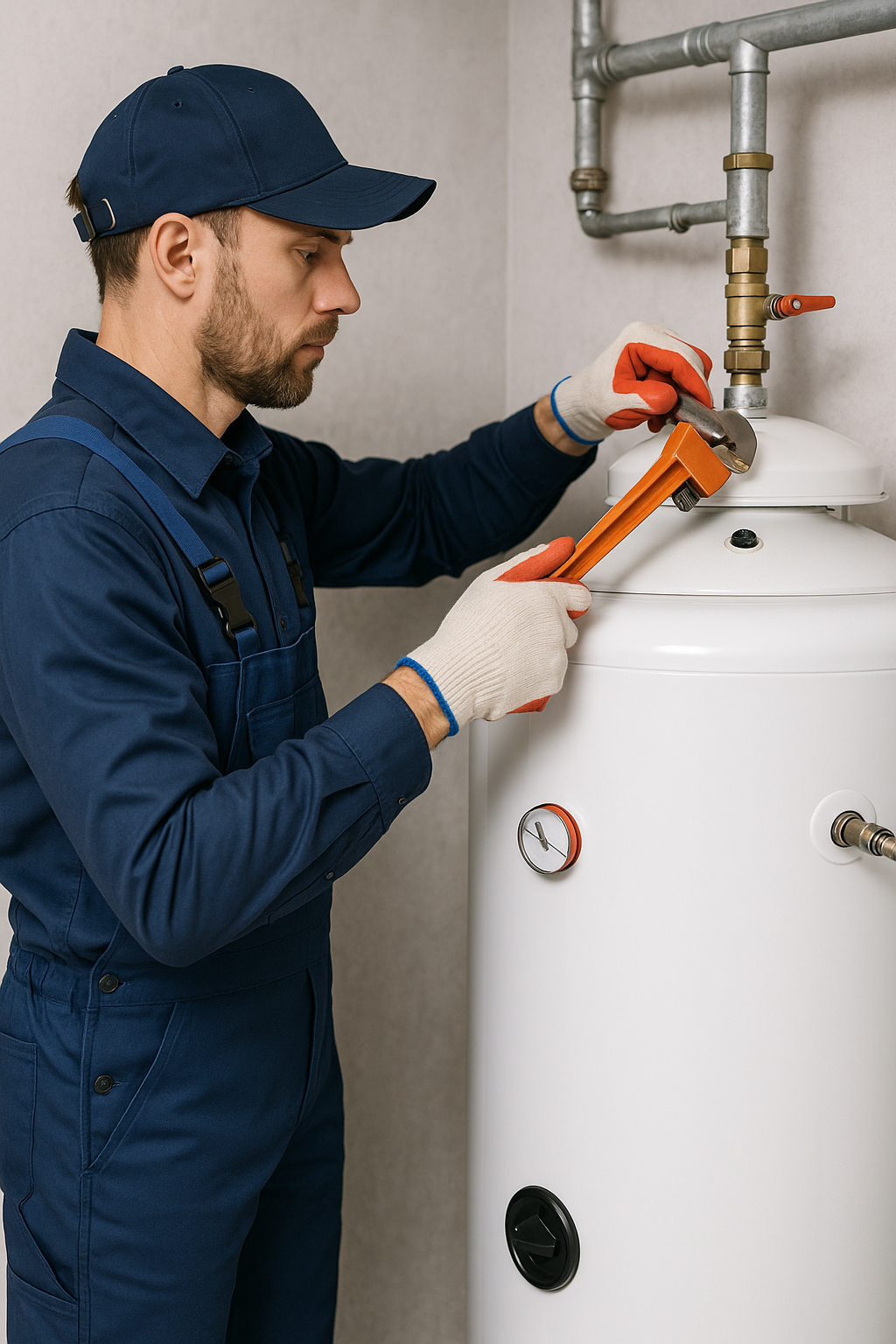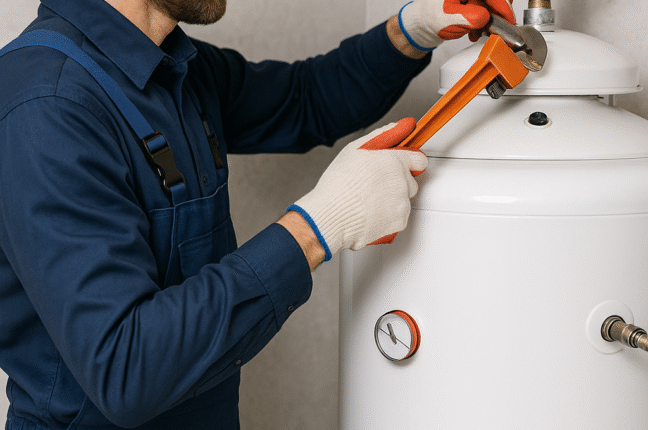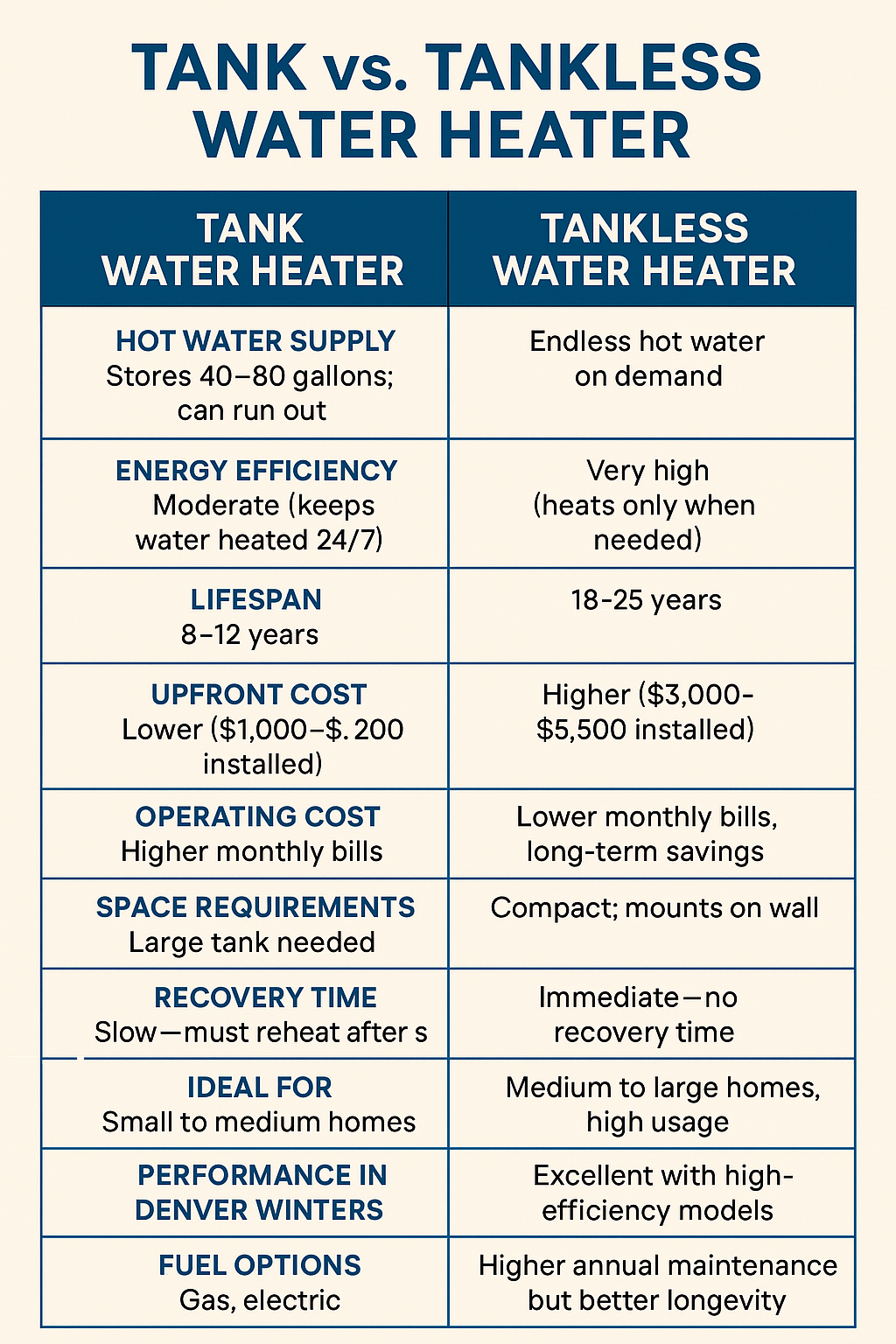
What Type of Water Heater Is Best for Your Home?
Choosing the best water heater for your home in Denver depends on your hot water needs, fuel source, efficiency goals, and budget. At Mini-Splits by Joseph, we install the most reliable and energy-efficient tank and tankless water heaters on the market. Here’s a breakdown of the top-performing models and brands trusted by homeowners across Colorado.
1. Best Overall: Rheem Performance Series
Rheem offers dependable gas, electric, and tankless units with strong warranties, great efficiency, and excellent long-term performance. They are a top choice for both durability and value.
Best for: Most Denver homeowners, budget-friendly installs, long lifespan.
2. Best Tankless: Navien NPE-Series
Navien is known for ultra-efficient, low-maintenance tankless heaters. Their condensing units provide endless hot water while reducing energy costs—perfect for Colorado’s high utility rates.
Best for: High-demand households, luxury bathrooms, energy efficiency.
3. Best Traditional Tank: A.O. Smith Signature Series
A.O. Smith makes some of the longest-lasting tank-style heaters in the industry. Their gas and electric models offer quiet operation and consistent performance.
Best for: Homes needing simple, reliable, affordable hot water.
4. Best High-Efficiency: Bradford White Hydrojet Systems
Bradford White is a premium, professional-grade brand built to last 15–20 years with proper maintenance. Their high-efficiency tanks outperform standard models in recovery rate and longevity.
Best for: Homes wanting top-tier quality and long-term savings.
5. Best Budget-Friendly: American Water Heaters
A dependable choice for homeowners needing a quality unit without paying premium prices. Excellent for rental properties and smaller homes.
Best for: Affordable installs, rental units, small households.
Can I Go Tankless? (Denver, CO Homeowner Guide)
Many Denver homeowners ask the same question: “Can I go tankless?”
In most cases, yes—your home can be upgraded to a high-efficiency, on-demand tankless water heater. However, the answer depends on your home’s gas supply, venting, and electrical capacity.
Below is a simple, SEO-friendly guide to help you understand whether tankless is right for you.
What You Need to Switch to a Tankless Water Heater
1. Gas Supply
Most Denver homes can support a gas tankless system.
Tankless units typically require:
-
A ¾-inch gas line
-
Proper gas pressure for high demand
-
Natural gas or propane availability
If your current water heater is gas, you’re already halfway there.
2. Proper Venting
High-efficiency tankless heaters use PVC venting through an exterior wall or roof.
Older homes may need venting upgrades, which is normal and often included in installation costs.
3. Standard Electrical Power
Even gas tankless systems need a 120V outlet for ignition and freeze protection.
If your utility area doesn’t have one, we can easily add it during installation.
Can I Install an Electric Tankless Water Heater?
Electric tankless systems are usually not recommended in Colorado, because they require:
-
A 200-amp electrical panel
-
Three to four 240V double-pole breakers
-
Heavy-gauge wiring increases
Most Denver and Front Range homes do not meet these requirements without major electrical upgrades—so gas tankless is the preferred option.
Do Tankless Water Heaters Work in Denver’s Cold Winters?
Yes—gas tankless water heaters work extremely well in Colorado, even with cold incoming water, when properly sized.
Benefits include:
-
Endless hot water
-
Lower energy use
-
Space-saving wall-mounted design
-
Longer lifespan compared to traditional tanks
When Tankless Is a Good Fit
You’re a strong candidate if you want:
-
Continuous hot water
-
Lower utility bills
-
A long-lasting system
-
A modern, efficient upgrade
-
More space in your mechanical room
When Tankless May Not Be Ideal
-
No gas service available
-
Limited electrical panel capacity
-
Extremely tight installation area
-
Budget constraints (tankless costs more upfront)
Should You Go Tankless?
For many homes in Denver, Lakewood, Edgewater, Wheat Ridge, and the Front Range, the answer is yes—tankless is an excellent upgrade that delivers efficiency and endless hot water.
Mini-Splits by Joseph can evaluate your home and recommend the best tankless or traditional system based on your needs and budget.
📞 Call Today: 970-798-0096
📍 Serving Denver & the entire Front Range
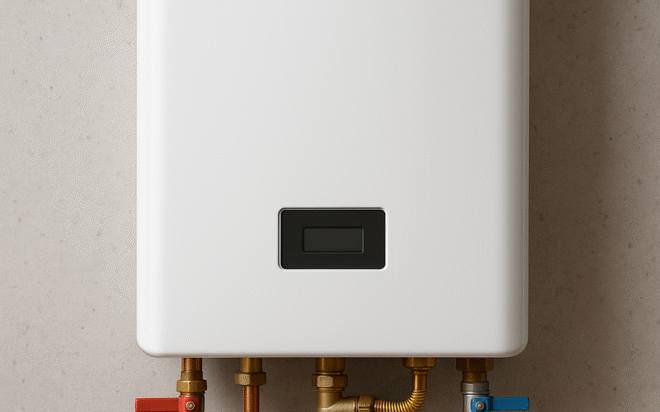
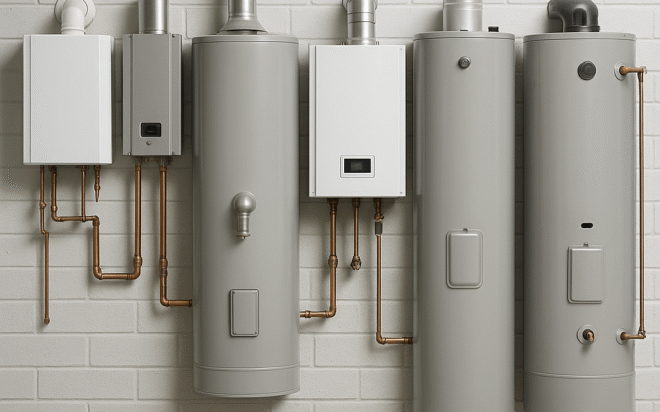
How the Process From Estimate to Installation Works
At Mini-Splits by Joseph, we make upgrading your water heater fast and easy. Here’s how the process works:
1. Get Your Estimate
Call or message us with a few details about your current system. We provide a fast, upfront estimate for tank or tankless options.
2. On-Site Check (If Needed)
We confirm gas, venting, electrical, and space requirements to ensure accurate pricing with no surprises.
3. Upfront Pricing
You receive a clear price and system options based on your home, budget, and hot water needs.
4. Schedule Installation
Most jobs can be scheduled same day or next day.
5. Professional Installation
We remove your old unit, install the new system, handle plumbing/electrical/venting, and test everything for safety and performance.
6. Final Walkthrough
We clean up, show you how the system works, and review maintenance and warranty info.
📞 Call Today: 970-798-0096
Proudly serving Denver & the Front Range.

Our expertise
Portfolio
FAQ
-
How Much Does a Tankless hot water System Cost to Install in Denver and the Front Range?
$5,500 – $17,500
🛠 What Drives the Cost Up (and Down)
Here are the major factors that influence how much a tankless system will cost:
-
Unit cost & brand
Higher‐flow units, premium brands, and gas/condensing models cost more up-front -
Fuel source
Gas tankless typically offers better performance in Denver’s colder climate but requires proper venting/gas line work. Electric tankless may require major panel/wiring upgrades. -
Home’s existing infrastructure
-
Are there existing gas lines of proper size?
-
Is the venting adequate or does it need upgrade/new route?
-
Does the work require relocating the unit, running new piping or electrical?
These can add thousands of dollars.
-
-
Installation complexity & labor
Labor in older homes, multi-level homes, crawl spaces, or where major modifications are required will cost more. Permits, inspection, code upgrades all add, -
Size / flow requirements
A larger household with high hot water demand needs a unit with higher GPM (gallons per minute) or multiple units. Bigger capacity = higher cost. -
Rebates & incentives
Some systems may qualify for rebates or tax credits, which can offset cost — good to mention to customers.
-
-
Will I Need an Electrical Upgrade for My New Hot Water System?
Whether you need an electrical upgrade depends on the type of water heater you’re installing. Some systems plug right into your home’s existing setup, while others require major electrical improvements to operate safely and efficiently.
Below is a simple breakdown to help you understand what to expect.
1. Tank Water Heaters (Gas or Electric)
Gas Tank Water Heater
Usually NO electrical upgrade needed.
Gas heaters only require a standard 120V outlet for ignition and safety controls. Most homes already have this.You might need an upgrade if:
-
There’s no available outlet nearby
-
The existing outlet isn’t grounded properly
-
You’re switching from electric to gas
Electric Tank Water Heater
Sometimes requires an upgrade.
Most electric tank heaters require 240V power on a dedicated circuit.You will need an electrical upgrade if:
-
Your panel doesn’t have a 240V breaker
-
Your existing wiring is too small for the amperage (30A–50A)
-
Your electrical panel is full or outdated
2. Tankless Water Heaters
Gas Tankless Water Heater
Rarely requires electrical work, but:
-
It still needs a 120V outlet for ignition and freeze protection
-
Older homes may not have a proper electrical outlet in the installation area
Typically, no major electrical upgrade is needed unless the area has no power at all.
Electric Tankless Water Heater
YES — almost always requires a major electrical upgrade.
Electric tankless heaters are very powerful devices. Most need:
-
3 to 4 separate 240V circuits
-
120–160 amps of available panel capacity
-
Heavy-gauge wiring
If your home has a 100–150 amp panel, it will almost certainly need an upgrade to 200 amps before installing an electric tankless system.
This is the #1 reason most homeowners choose a gas tankless instead.
3. Hybrid Heat Pump Water Heaters
These units often require:
-
A dedicated 240V circuit
-
Proper grounding
-
Sufficient electrical panel capacity
If you’re replacing a standard electric tank heater, you’re usually fine. If you’re switching from gas → hybrid, you’ll likely need a new circuit installed.
So, Do You Need an Upgrade? (Quick Guide)
Water Heater Type Electrical Upgrade Needed? Gas Tank ❌ Usually No Electric Tank ⚠️ Sometimes Gas Tankless ❌ Rarely Electric Tankless ✅ Almost Always Hybrid Heat Pump ⚠️ Sometimes
Need Help Deciding?
At Mini-Splits by Joseph, we install tank, tankless, gas, electric, and hybrid systems—and we handle all plumbing and electrical, so your upgrade is safe and up to code.
📞 Call Today: 970-798-0096
Serving Denver, Edgewater, Lakewood, Wheat Ridge & the metro area. -
-
Mini-Splits by Joseph proudly serves homes and businesses across the Denver Metro and Front Range areas.
Counties We Serve
-
Denver County
-
Arapahoe County
-
Jefferson County
-
Adams County
-
Douglas County
-
Boulder County
-
Broomfield County
-
Weld County
-
Larimer County
-
El Paso County
Cities & Towns We Serve
-
Denver
-
Aurora
-
Lakewood
-
Littleton
-
Englewood
-
Centennial
-
Highlands Ranch
-
Arvada
-
Westminster
-
Thornton
-
Northglenn
-
Golden
-
Broomfield
-
Boulder
-
Longmont
-
Louisville
-
Lafayette
-
Erie
-
Brighton
-
Commerce City
-
Parker
-
Castle Rock
-
Lone Tree
-
Fort Collins
-
Loveland
-
Greeley
-
Colorado Springs
Neighborhoods & Local Communities in the Denver Metro
-
Capitol Hill
-
Washington Park (Wash Park)
-
Congress Park
-
Cherry Creek
-
Park Hill
-
Sloan’s Lake
-
Highlands / LoHi (Lower Highlands)
-
RiNo (River North Art District)
-
Five Points
-
Baker
-
Belcaro
-
Hilltop
-
University Hills
-
Stapleton (Central Park)
-
Green Valley Ranch
-
Montbello
-
Hampden South
-
Harvey Park
-
Sunnyside
-
Berkeley
-
City Park
-
Downtown Denver
-
-
Do you offer Xcel, Hear, Her, Rebates?
-
Tank vs. Tankless Water Heater Comparison Chart
Feature Tank Water Heater Tankless Water Heater Hot Water Supply Stores 40–80 gallons; can run out Endless hot water on demand Energy Efficiency Moderate (keeps water heated 24/7) Very high (heats only when needed) Lifespan 8–12 years 18–25 years Upfront Cost Lower ($1,000–$2,200 installed) Higher ($3,000–$5,500 installed) Operating Cost Higher monthly bills Lower monthly bills, long-term savings Space Requirements Large tank needed Compact; mounts on wall Recovery Time Slow—must reheat after use Immediate—no recovery time Ideal For Small to medium homes Medium to large homes, high usage Performance in Denver Winters Consistent but less efficient Excellent with high-efficiency models Fuel Options Gas, electric Gas (most common), electric Maintenance Lower annual maintenance Higher annual maintenance but better longevity Environmental Impact Moderate Lower carbon footprint
